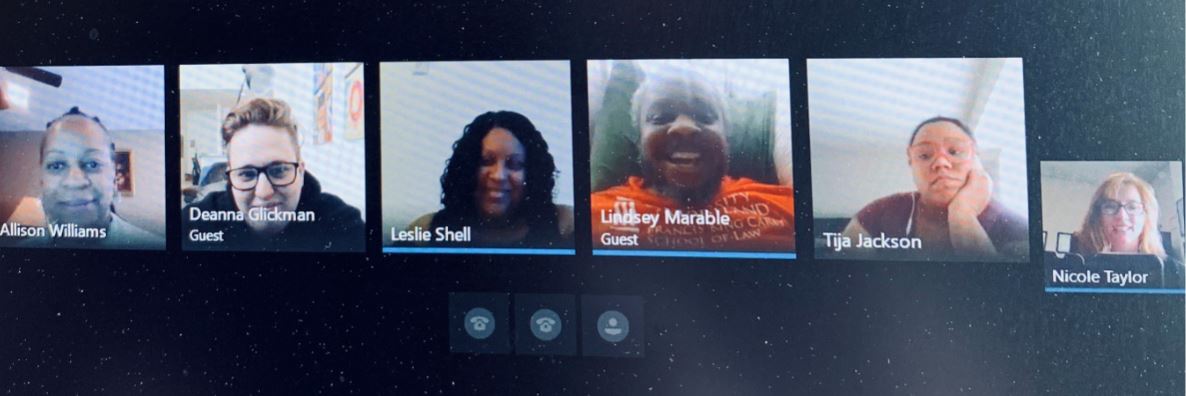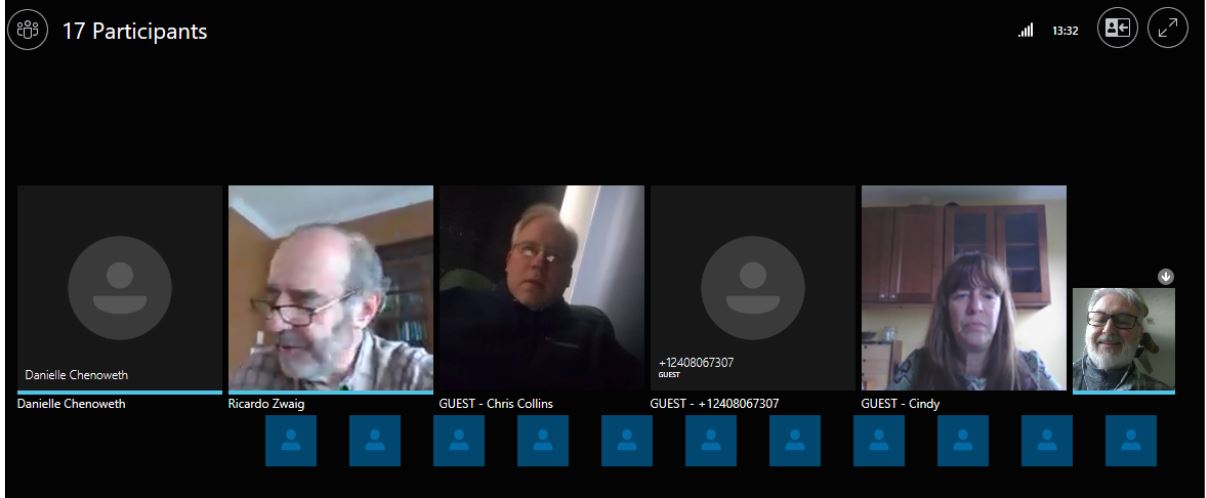187 Harry S. Truman Parkway
Annapolis, Maryland 21401
410-260-1488
Maryland Judiciary shares stories of success amid COVID-19
in honor of National Drug Court Month | Week 5
The novel coronavirus, COVID-19, pandemic is proving to be one of, if not the most, challenging and unprecedented events in the history of the Maryland Judiciary. Judiciary leadership, judges, and court staff are working tirelessly to maintain essential daily operations amid the global pandemic.
The Maryland Judiciary’s Problem-Solving Courts are paving the way in finding new innovative ways to connect, assist, and support current participants in the Judiciary’s substance abuse, mental health, and veteran’s treatment programs.
Experts say participants may be triggered by the anxiety, uncertainty, and stress brought on by the challenges in facing a global pandemic and as a result, those individuals are more susceptible to potential relapse.
Judges and problem-solving court staff are at the forefront when it comes to leading the courts in finding new ways of using technology to facilitate their dockets and manage treatment courts during these critical and trying times.
Last month, the National Association of Drug Court Professionals (NADCP) celebrated National Drug Court Month. Due to COVID-19, the Judiciary joined NADCP in acknowledging drug court programs by featuring the many recent success stories from various treatment courts throughout Maryland. The Judiciary highlights here two programs by sharing their stories of success during the COVID-19 crisis.
The novel coronavirus, COVID-19, pandemic is proving to be one of, if not the most, challenging and unprecedented events in the history of the Maryland Judiciary. Judiciary leadership, judges, and court staff are working tirelessly to maintain essential daily operations amid the global pandemic.
The Maryland Judiciary’s Problem-Solving Courts are paving the way in finding new innovative ways to connect, assist, and support current participants in the Judiciary’s substance abuse, mental health, and veteran’s treatment programs.
Experts say participants may be triggered by the anxiety, uncertainty, and stress brought on by the challenges in facing a global pandemic and as a result, those individuals are more susceptible to potential relapse.
Judges and problem-solving court staff are at the forefront when it comes to leading the courts in finding new ways of using technology to facilitate their dockets and manage treatment courts during these critical and trying times.
Last month, the National Association of Drug Court Professionals (NADCP) celebrated National Drug Court Month. Due to COVID-19, the Judiciary joined NADCP in acknowledging drug court programs by featuring the many recent success stories from various treatment courts throughout Maryland. The Judiciary highlights here two programs by sharing their stories of success during the COVID-19 crisis.
Baltimore City District Court Adult Drug Treatment Court celebrates a graduate during COVID-19
“Graduation is a special moment, and we were able to make him really feel it.”
BALTIMORE, Md. - To continue the strides participants are making and the workflow of the Baltimore City District Court Adult Drug Treatment Court (DTC) program during the COVID-19 pandemic, Baltimore City District Court Judge Nicole Taylor holds remote dockets and court staff meet remotely every Tuesday and Thursday prior to each docket.
“Our drug court team has been hosting remote hearings with Skype for Business since the first week of April,” said Judge Taylor. “There are usually 10 to 12 people on the call, and we’ve gotten pretty good at all having a chance to speak to our participants.”
On April 16, Judge Taylor held a virtual graduation for one drug court participant who recently completed the program.
“We played the song ‘Celebration’ for our graduate. He was laughing and happy, and everyone, from the assistant state’s attorney to his probation agent and the six other team members, got to congratulate him individually. Graduation is a special moment, and we were able to make him really feel it,” said Judge Taylor.
The drug court participants are at different stages within the program. Currently, there are 27 active participants in the Baltimore City District Court DTC program. Program partners include Division of Parole and Probation, the Baltimore City’s State's Attorney’s Office, the Office of the Public Defender, and Behavioral Health Systems Baltimore (BHSB).
During COVID-19, Drug Court Coordinator Leslie Shell notes that case managers work remotely and remain in close contact with each participant.
“Case manager responsibilities include making recommendations for healthcare, smart phone programs, social service programs, and other community organizations that are assisting with grocery delivery and medication delivery services,” said Shell.
In 2019, the Baltimore City District Court DTC celebrated its 25th anniversary. The program was Maryland’s pioneer problem-solving court.
The DTC was founded in 1994 as a comprehensive court-supervised and voluntary treatment-based program for substance users charged with misdemeanor and concurrent jurisdiction felonies in the District Court. Since then, more than 1,400 people have participated in 54 graduations. The program’s mission is to serve the community and increase public safety by integrating a coordinated treatment response for those with substance use disorders.
Last year, the DTC was restructured to perform in accordance with the National Association of Drug Court Professionals’ best practices guidelines to better serve a community plagued by the opioid epidemic. The program’s new motto is “Choose to Live.”
Baltimore City District Court Adult Drug Treatment Court hopes to eventually host an in-person graduation ceremony to celebrate all the participants’ accomplishments.

Participant says Howard County District Court Adult Drug and DUI Court saves lives
“Our team is doing everything we can to maintain a high level of service and support during this difficult time.”
ELLICOTT CITY, Md. - Judge Ricardo D. Zwaig and staff at the Howard County District Court Adult Drug and DUI Court remain focused on providing support to participants during the COVID-19 pandemic.
Since the courthouse closed to the public on March 17, all communications with each participant and their program coordinator, Jack Altfather, are virtual. Currently, there are a total of 46 active participants. This includes 28 participants in DUI Court and 22 participants in drug court.
Altfather notes that a case manager on the team keeps in touch with participants via Skype for Business, phone calls, and text messages to ensure that they are not only supported but meet their program obligations. Additionally, the public defender on the team does the same to keep in touch with clients.
“Substance use disorder is a disease that is affecting a huge segment of our population in Howard County, Maryland,” said Judge Ricardo Zwaig, who presides the Howard County District Court Adult Drug Court and DUI Court program. “Our team is doing everything we can to maintain a high level of service and support during this difficult time.”
During the COVID-19 emergency, Judge Zwaig has conducted bi-weekly virtual review hearings with each participant via Skype for Business to offer constructive advice.
“We have implemented an effective approach to help those in crisis,” said Judge Zwaig. “Our team guides participants through treatment programs, which include a wide range of therapies and compliance mechanisms. We also address any co-occurring mental health issues, which often accompany this condition. Treatment is not ‘one size fits all,’ as participants are re-evaluated when conditions require it,” said Judge Zwaig.
Treatment providers that work with the District Court in Howard County have expanded their video conferencing options to Zoom and offer outdoor group therapy using social distancing practices.
On April 15, after Judge Zwaig held a review hearing, one participant texted, “It became very clear to me why drug court works and you all play a huge part in that. I don’t believe it would be as effective if one of you were missing. I know it has literally saved my life and for that I am eternally grateful.”
Altfather shared that one participant is homeless and the team was able to provide supplies, food, and clothing for during the COVID-19 pandemic.
“Our health department has been doing an excellent job providing resources to our participants regarding food, jobs, and medical needs,” said Altfather.
Additionally, Altfather noted that the homeless participant is currently in the process of being placed into a home soon.
During COVID-19, Judge Zwaig also officiated his first virtual graduation on May 8 for 13 participants.
The next graduation is scheduled for November 2020.

# # #
(June 12, 2020)
